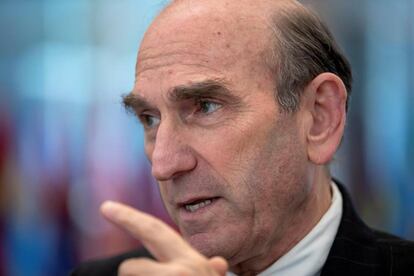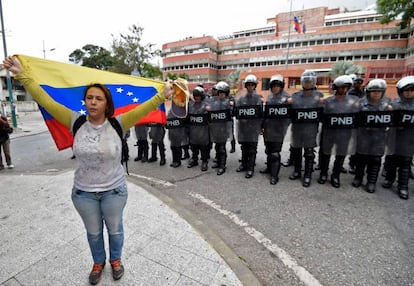The US replies to Spain on Venezuela: “We don’t do cowboy diplomacy”
Elliott Abrams, the special representative for the South American country, tells EL PAÍS that there has already been military intervention there by Cuba


The United States has reacted to Spain’s criticism of the way it is handling the ongoing crisis in Venezuela, where a recent attempt by interim president Juan Guaidó to lead a military uprising against the government of Nicolás Maduro failed, triggering further violence.
Speaking on the state-owned broadcaster TVE, Spanish Foreign Minister Josep Borrell on Wednesday said that the US is acting “like the cowboys in the Far West, saying ‘careful or I’ll draw’.” He warned that the solution to the Venezuelan crisis can only be “peaceful, negotiated and democratic.”
In statements to EL PAÍS, the US Special Representative for Venezuela, Elliott Abrams, has defended his government’s tough talk against the pressure from other countries that support Maduro, such as Russia and Cuba.

Abrams said that “there is already a military intervention in Venezuela, by Cuba.” The special representative said that Maduro’s bodyguards are from Cuba, and that Russia is evidently getting more deeply involved, as it recently sent 100 soldiers to the South American nation.
“It is wrong to think that [interim president Juan] Guaidó will be able to deal with the Russians and the Cubans, and that is something in which the US will have to have a role,” said Abrams. “To make it clear that Russia will not have freedom of action in Venezuela is a responsible statement, not cowboy diplomacy.”
National Assembly President Juan Guaidó was recognized as the interim president of Venezuela by the US in January. Around 50 countries have since followed suit, including Spain. But so far he has been unable to rally enough support from the military or the population to force out Maduro.
On the day of the failed attempt at a military uprising, another leading dissident, Leopoldo López, made a surprise appearance next to Guaidó despite being formally under house arrest. López subsequently took refuge at the residence of the Spanish ambassador in Caracas, pushing Spain into a bigger role in the crisis.
The US government has repeatedly said that it is not ruling out military intervention in Venezuela, but it has yet to define the red line that would trigger such a move. Canada and Europe support Guaidó but reject the military option.
English version by Susana Urra.
Tu suscripción se está usando en otro dispositivo
¿Quieres añadir otro usuario a tu suscripción?
Si continúas leyendo en este dispositivo, no se podrá leer en el otro.
FlechaTu suscripción se está usando en otro dispositivo y solo puedes acceder a EL PAÍS desde un dispositivo a la vez.
Si quieres compartir tu cuenta, cambia tu suscripción a la modalidad Premium, así podrás añadir otro usuario. Cada uno accederá con su propia cuenta de email, lo que os permitirá personalizar vuestra experiencia en EL PAÍS.
¿Tienes una suscripción de empresa? Accede aquí para contratar más cuentas.
En el caso de no saber quién está usando tu cuenta, te recomendamos cambiar tu contraseña aquí.
Si decides continuar compartiendo tu cuenta, este mensaje se mostrará en tu dispositivo y en el de la otra persona que está usando tu cuenta de forma indefinida, afectando a tu experiencia de lectura. Puedes consultar aquí los términos y condiciones de la suscripción digital.








































